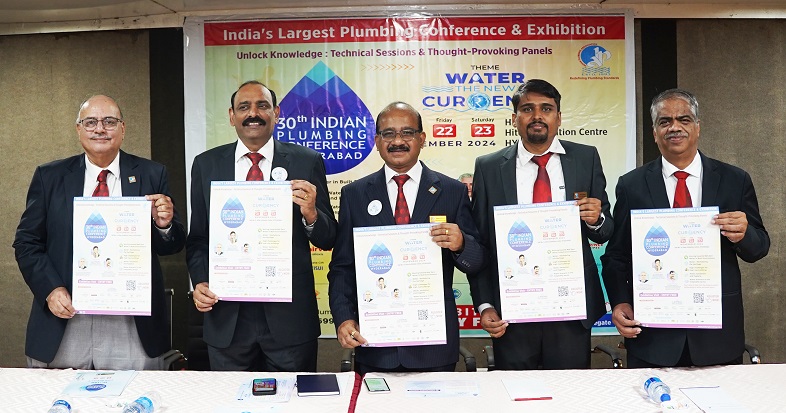Hyderabad, November 12th, 2024…..The 30th Indian Plumbing Conference, the largest-ever gathering of the Plumbing industry, will be held in the city this month from November 21st to 23rd at Hitex.
The theme of the conference will be Water-The New Currency
The theme emphasizes water’s vital role in sustainability and climate action, promoting initiatives like Green Credits and Water Credits to support India’s goal of achieving net-zero emissions by 2070. This conference aims to enhance water management, inspire innovation, and foster economic resilience by encouraging water-efficient technologies and aligning with national carbon reduction targets.
The conference will be organized by the 31-year-old Indian Plumbing Association (IPA), an NGO and an apex body of plumbing professionals in India.
Shri D. Sridhar Babu, Minister for IT, Electronics & Communications, Industries & Commerce, Government of Telangana will grace the occasion as the Chief Guest, and Shri Dana Kishore, Principal Secretary, Municipal Administration and Urban Development, will be the guest of honour.
The Keynote Speaker will be Mr. Søren Nørrelund Kannik-Marquardsen, Commercial Counsellor, Head of the Trade Council New Delhi & Regional Coordinator for South Asia, Embassy of Denmark in India
1500 plus delegates from across India and abroad will participate. Eighty exhibitors to showcase their products and services. More than 8000 visitors are expected to visit the conference cum expo.
The conference will host engaging technical sessions and panel discussions, including Water—The New Currency; Moving Towards Net Zero Water in the Built Environment; Water—Revitalizing the Heritage; High Challenges for High-Rise Buildings; Water, Sanitation, and Hygiene and Water Scenario in the Hospitality Sector
The conference will feature distinguished speakers, including Shri. Avinash Mishra, Chairman, Water Audit Council & Former Adviser, NITI Aayog; Dr. Rama Kant, Deputy Adviser (PHE), Ministry of Housing and Urban Affairs; Prof. Srinivas Chary, CEO, WASH Innovation Hub and Centre Director, ASCI; Shri. Stanley Samuel, Founder, Eco Soft PTE, Singapore; Shri. Nitin Bassi, Senior Program Lead, CEEW; Shri. Rahul Sachdeva, Senior Program Manager, NIUA; Shri. Goutam Reddy, Vice Chairman, RE Sustainability Ltd; Smt. Charu Thapar, Executive Director-Property and Asset Management, Asia Pacific JLL; Shri. HC Vinayaka, Vice President, Technical EHS and Sustainability, ITC; Shri. Prem Thakur, VP Technical Services, IHCL (Taj Group); Sh. Valluri Srinivas, CEO, Synergy Infra Consultants
The conference will have knowledge-sharing sessions on water management in built spaces such as Water, Sanitation, Hygiene, and others.
Elaborating on how significant this conference is to Hyderabad Sanjay Bhilare, Chairman of the Hyderabad Chapter said it has blooming and robust real estate recording rapid growth. Infrastructure projects are flourishing, and there is a need for robust plumbing systems, water, waste management, recycling of treated water, and rainwater harvesting. Good plumbing not only ensures the longevity of our buildings but also enhances the quality of life for residents and communities, he added.
We will launch the Telugu version of ‘A Guide to Good Plumbing Practices’. It will be a Plumbing Engineering handbook, Sanjay said.
By 2030, India will have less than half of the total water demand. As per a NITI Aayog report, by then India will be able to supply 744 billion cubic meters of water against a demand for 1,498 billion cubic meters — a shortfall of over 50 percent. In recent incidences, we have seen Bengaluru and Chennai experiencing Day 0, Gurmit Singh, National President of IPA added.
“Day Zero” is the situation when a city’s water supply is almost completely depleted. When “Day Zero” is reached, taps run dry, and municipalities may enforce water restrictions and rations, Gurmit Singh, the Past National Chairman of the Indian Green Building Council. He is an expert on water conservation and reclamation. His domain knowledge includes achieving water use efficiency, water treatment, wastewater treatment, water refining, sewerage treatment, protection and preservation of water bodies, water audits, plumbing methods, and practices.
In the domestic water sector, the loss of water on account of leakages in mains, communication, and service pipes and valves is approximately 30 to 40% of the total flow in the distribution system, he added
India’s Increasing Water Footprint
Virtual Water Trade: India’s water footprint is also linked to the virtual water embedded in the goods it imports and exports. For instance, exports of water-intensive goods, such as rice, cotton, and sugar, indirectly lead to water depletion in regions that produce them, even if those regions are not consuming the water directly.
Exporting Water through Agriculture: India exports millions of tons of rice annually, which has a huge virtual water cost. 1 kg of rice requires around 3,000 liters of water to produce. Thus, India is, in a sense, exporting water to other nations through its agricultural exports, even as it faces its water crises.
The 30th Indian Plumbing Conference provides an important platform to discuss solutions and innovations that can help secure the future of water, ensuring its availability for all.
Water as an Economic Asset: Like money, water has intrinsic value. Its availability or scarcity can directly influence local economies, trade, and livelihoods. Communities that effectively manage water can gain a competitive edge.
Necessity of Reuse: As demand for water increases and sources become strained, water reuse and recycling are no longer optional—they are critical to sustainability.
Circular Economy Approach: Treating water as a “resource to be reused” fits well within the circular economy model, where the goal is to maximize the utility of resources—water being a prime example.
Plumbing’s Role in Water Efficiency
Plumbing Innovations: Advanced plumbing systems, such as low-flow fixtures, sensor-operated taps, smart water metering, and efficient pipe networks, are essential to both reduce water wastage and enable reuse.
Leak Detection and Prevention: Plumbing systems can be equipped with leak detection technology to prevent water loss, which accounts for a significant amount of water wastage in urban infrastructure.
Awareness and Best Practices: Plumbing professionals and the industry at large must play an educational role, in promoting water-efficient practices to the public and industries.
70 percent of communicable diseases spread through bad quality of water


